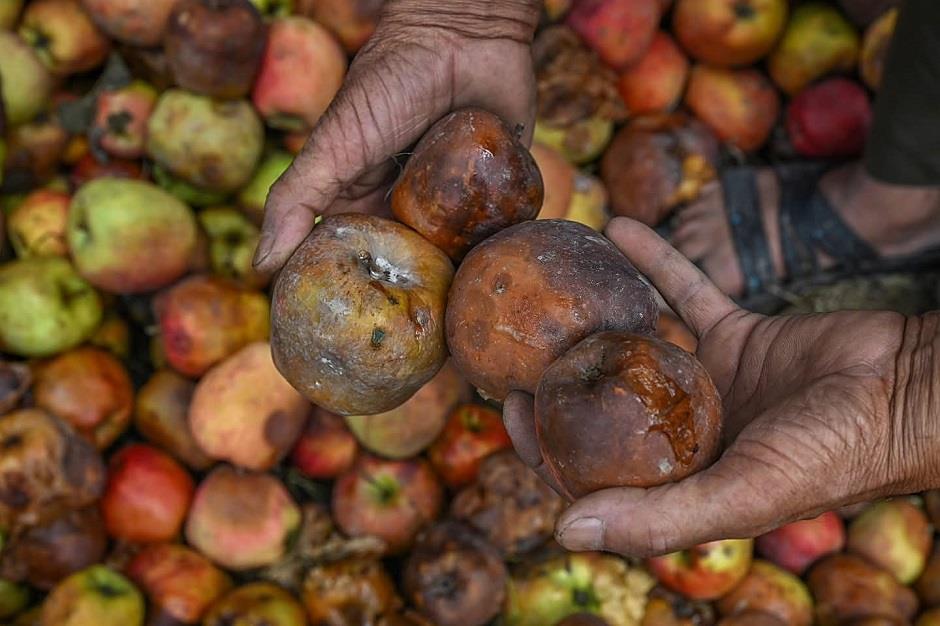Kashmir's Yearly Apple Crisis Wipes Out Millions
Rotten apples
By Aamir Wani
Every autumn, as the orchards of Shopian, Pulwama, and Sopore glow with red and gold apples, Kashmir prepares for its most important season.
Families gather to pluck fruit, pack wooden crates, and load them onto trucks bound for markets in Delhi, Mumbai, and beyond.
This is the moment when months of labour meet the promise of reward.
But, year after year, that promise is broken on the narrow bends of the Srinagar-Jammu National Highway.
The highway, Kashmir's fair-weather road to the rest of India, has become the most fragile link in the region's economy.
Some years, rain triggers landslides near Ramban. Other years, roadwork or tunnel blasting brings long closures.
Whatever the official explanation, the result is painfully familiar.
Truckloads of apples sit for days, sometimes weeks, until their cargo spoils. The fruit shrivels, the price collapses, and farmers return home with losses instead of earnings.
Apples are not a side business here. They are the backbone of Kashmir's rural economy. The industry supports nearly 3.5 million people and contributes close to 10 percent of Jammu and Kashmir's GDP.
For a family in a village orchard, the season's earnings can mean exam fees for a child, repayment of a loan, or money for healthcare.
When the crop fails to reach the market in time, everything else in their life falters too.
The losses ripple across the valley.
Delayed fruit floods local mandis at bargain prices. Cold stores overflow. Traders and truckers absorb heavy deficits. Middlemen swoop in to buy bruised produce at exploitative rates.
What begins on a blocked road soon spreads to households, classrooms, and clinics.
The damage is not just financial. It also corrodes hope.
Young Kashmiris see their parents' toil end in frustration and wonder whether farming has a future. Many choose city jobs or migration over the uncertainty of the orchard. That shift endangers not only livelihoods but also a cultural identity that has long defined Kashmir as the country's orchard.
Growers ask questions that deserve clear answers. Why do the closures always collide with harvest season? Why are fruit trucks not given priority passage? Why has Mughal Road not been developed into a reliable alternative? Why is the rail line that reaches Banihal not extended to connect Kashmir's produce with national markets?
The government cites Himalayan terrain, unpredictable rains, and security concerns. Farmers hear excuses while their fruit rots.
The solutions are neither new nor mysterious.
Stronger cold-chain storage could shield perishable crops from delays. Alternate roads could carry some of the traffic burden. Rail freight could transform the industry, moving apples more quickly and safely than any truck.
What is missing is the urgency to act.
Each September, the same story plays out. Trucks line the mountain highway, tarpaulins sagging under rain, wheels sinking into slush.
Inside are apples that once glistened in village orchards, now softening with every lost day.

Legal Disclaimer:
MENAFN provides the
information “as is” without warranty of any kind. We do not accept
any responsibility or liability for the accuracy, content, images,
videos, licenses, completeness, legality, or reliability of the information
contained in this article. If you have any complaints or copyright
issues related to this article, kindly contact the provider above.
Most popular stories
Market Research

- Primexbt Launches Empowering Traders To Succeed Campaign, Leading A New Era Of Trading
- Blueberry Launches A Bold New Brand Platform
- Zircuit Launches $495K Grants Program To Accelerate Web3 Super Apps
- Tapbit At TOKEN2049: Reshaping The Crypto Landscape Through Product Innovation
- With Seal, Walrus Becomes The First Decentralized Data Platform With Access Controls
- 1Inch Becomes First Swap Provider Relaunched On OKX Wallet




















Comments
No comment